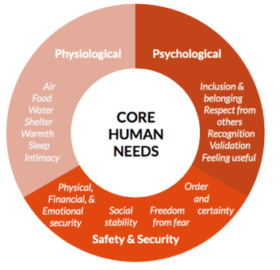By Le’alani S. Boykin, AICP
Photo by Alexei Scutari on Unsplash
You and I, and everyone else on this planet, have needs. And those needs are begging to be fulfilled, anywhere, anytime, anyhow. We have a constant need to feel fed and nourished, well rested, protected, and emotionally supported. In our society we tend to assume that we must take care of most of this stuff in our personal lives. They are personal needs so they should only be fulfilled on our own time, in our private lives, right? Whatever you think is the right place to have your needs met, they are with you in EVERY setting of your life. And they show up big time in meetings.
Do you ever feel confused, tired, hungry, disrespected, afraid, lonely, or anxious in a meeting? These emotions reflect core human needs that are unmet and possibly challenged. Meetings have the potential to be extremely challenging psychological experiences for humans. They require us to meet with other people that we may or may not be familiar or jibe with, and actually accomplish something together. Meetings require us to communicate, collaborate, listen, assert, negotiate, and analyze, all while we are unconsciously working to fulfill needs that keep our bodies, minds, and self-esteem healthy.
Over the past seven decades, numerous theories and models have been developed to represent human needs and motivation (think Maslow’s Hierarchy of Needs). Among them, there is a general agreement that we all have the following core human needs:
- Physiological – food, water, shelter, warmth, sex, sleep
- Security & safety – emotional security, financial security, law and order, freedom from fear, social stability, safety against accidents and injury
- Psychological – belonging/social connection and esteem/dignity/respect from others

As facilitators, a large part of the group or community’s success depends on whether we are helping to meet participants’ core needs. Is the room keeping everyone at a comfortable temperature? Does everyone know why we’re meeting and how we’re accomplishing the desired outcomes? Does each person feel included in the discussion? If the answer is “no” to any of these questions, then you’re likely leading a meeting with distracted and irritable people. If they aren’t comfortable, certain of what’s going on, or feeling excluded, chances are y’all won’t get much done.While all core human needs are critical to leading productive meetings, most of the needs associated with meetings are psychological. When any of us decides to devote our time to attend a meeting, we need to feel we are included, respected, seen, heard, recognized, validated, useful, and increasingly, we need to feel we are empowered. If any of these aren’t met, we can begin to see challenging behavior from anyone.
So how do we meet participants’ psychological needs? There are a few simple techniques that tend to serve me well: Make Room to Talk, Reflective Listening, and Co-Creating the Agenda.
Make Room to Talk

While we can’t possibly meet everyone’s needs in a matter of one or two hours in a room or on a Zoom call, there is still plenty we can do to put people at ease so they can better participate in our meetings. Next time you’re planning to facilitate, consider what your teammates, community members, or participants might be needing from the space or the process. Your proactive, needs-based meeting planning can help you to avoid unnecessary disruptions, build trust and understanding, and ultimately accomplish what everyone is at the table to do.
Aloha,
Le’alani
Before or at your next meeting, you can use this table as a guide to anticipate and identify needs of your participants with this free download: Meeting Participant Needs
